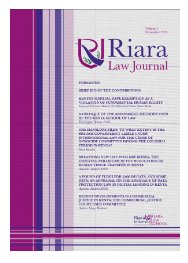 The Riara Law School is pleased to publish its inaugural edition of the Riara Law Journal focusing on the broad area of Law in a Society in Flux.
The Riara Law School is pleased to publish its inaugural edition of the Riara Law Journal focusing on the broad area of Law in a Society in Flux.
Established in 2012, the Riara Law School has carved a niche as one of the leading Law Schools in Kenya focusing on providing high quality and innovative legal education to prepare lawyers to anticipate and tackle these challenges and opportunities of the 21st Century.
The Riara Law Journal is envisaged as a leading a peer-reviewed publication of the Riara Law School, devoted to provide a platform for lawyers, academics, practitioners and legal scholars to research and publish on topics related to legal innovation in diverse topics pertinent and relevant to the promotion of legal scholarship in Africa.
The main contributors to the journal are faculty. Submissions from graduate students undergoing professional qualification at the Kenya School of Law may be considered. CLICK HERE TO ACCESS




